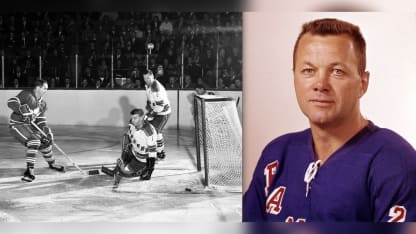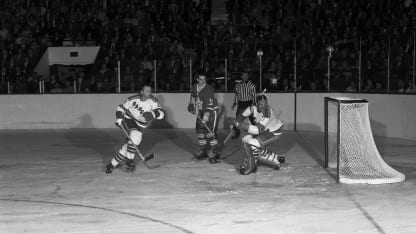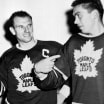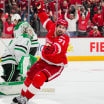Legendary hockey reporter Stan Fischler writes a weekly scrapbook for NHL.com. Fischler, known as "The Hockey Maven," shares his humor and insight with readers each Wednesday.
This week flashes back six decades when future Hockey Hall of Fame defenseman Doug Harvey became the last player-coach in NHL history. In addition to Harvey's remarkable double feat, he won the Norris Trophy and led the New York Rangers to their first Stanley Cup Playoff series in four years.
The New York Rangers and Montreal Canadiens pulled off one of biggest trades in NHL history when defenseman Lou Fontinato, one of New York's most popular players, was sent to Montreal on June 13, 1961. In return, the Rangers received one of the most outstanding defensemen in the League, Doug Harvey.
Following the startling exchange, Rangers general manager Muzz Patrick revealed that Harvey would do double duty as both player and head coach.
"I intend to play a full schedule," Harvey said, "as well as coaching. Last year I played 40 minutes of each game and I expect to do as much this year."
And he did, immediately delivering results both on and off the ice. In his Rangers debut against the Boston Bruins at Boston Garden on Oct. 11, 1961, he scored a goal and coached New York to a 6-2 victory. His encore the next night at Madison Square Garden was equally successful, a 6-3 victory against the Bruins led by Andy Bathgate's hat trick.
"When Doug returned with the Rangers to Montreal (on Oct. 14), he was given an ovation by the crowd as he skated out in a Ranger uniform, but the Canadiens beat them 3-1," wrote Charles Coleman in "The Trail of The Stanley Cup."
Although Harvey was 36 at the time, he showed no sign of aging. He had three assists in a 4-0 win against the Detroit Red Wings on Nov. 22, 1961, and one night later scored the game-winning goal in a 4-3 victory at the Bruins.
"A year ago," Patrick said, "if we were down a goal, we'd run around like chickens with their heads cut off, but Doug never loses his poise. He won't let the team panic."
Veteran forward Johnny Wilson credited Harvey's coaching technique with being ahead of its time.
"Doug played like the Russians," he said. "When he had the puck, the other four guys had to create opportunities."
The press marveled as well. One writer opined, "What a joy to see Harvey outwit a charging forward and then turn the play in the other direction."
Harvey had the knack for turning ordinary players -- like Rangers defenseman Harry Howell -- into future Hall of Famers.
"It was Doug who changed my hockey life by making me carry the puck more," Howell said.
Bathgate said that he never would have been able to tie Bobby Hull of the Chicago Black Hawks for the scoring title (84 points in 70 games) without Harvey's advice.
"He told me to shoot more," Bathgate said, "and I did. Doug made the difference."
But Harvey's double-duty eventually took a toll. He got homesick for his native Montreal, and he was dismayed over the Rangers' poor practice rink and medical facilities. Yet he pressed on, hoping to lead New York to a Stanley Cup Playoff berth.
"I'm in a ticklish position," Harvey said in his biography, "The Doug Harvey Story," written by William Brown. "I have to have the cooperation of my players to succeed."
From the beginning of the season right to the end, Harvey's skaters were behind him all the way. Or, as goalie Gump Worsley said, "We busted our guts for him."
In the end, it paid off handsomely. The Rangers defeated the Red Wings 3-2 at the Garden on March 14, 1962, the springboard to them clinching their first playoff berth since 1958.



















